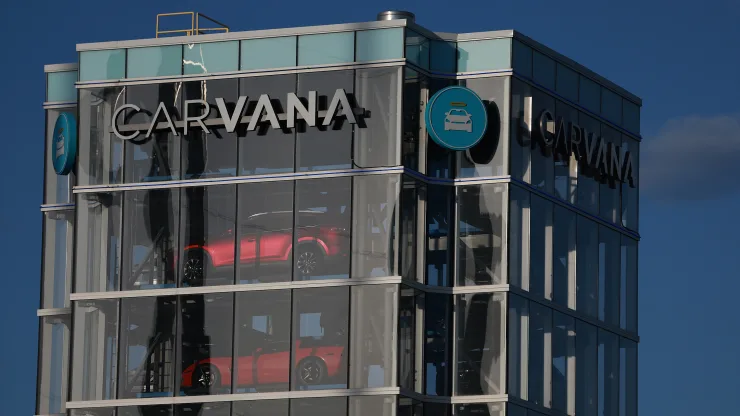
Shares of Carvana plummeted for a second-consecutive trading day as investors unloaded shares of the embattled used-vehicle seller amid growing challenges for the company and a softening for the industry.
The stock ended the trading day off 15.6% at $7.39 per share after brief trading halts earlier in the day and being down as much as 23.7% at one point to $6.68 per share — its lowest point on record.
Volume spiked on the beaten-down used car seller, with more than 52 million shares changing hands, including more than 9.2 million during the first 22 minutes of trading. That compares with the stock’s 30-day average volume of 14.14 million.
Monday’s trading volume was the second-highest on record for the stock, behind only the 71 million shares that traded hands on Friday.
Shares of Carvana have plummeted by about 97% this year after reaching an all-time intraday high of $376.83 per share on Aug. 10, 2021. They’re down 48.5% since Thursday’s close, shortly before Carvana missed Wall Street’s top- and bottom-line expectations for the third quarter as the outlook for used cars falls from record demand, pricing and profits during the coronavirus pandemic.
Cox Automotive’s Manheim Used Vehicle Value Index, which tracks prices of used vehicles sold at its U.S. wholesale auctions, has fallen by 15.4% this year through October after peaking in January, including a 2.2% decline from September to October.
Retail prices traditionally follow changes in wholesale. That’s good news for potential car buyers, however not great for companies such as Carvana that purchased the vehicles at record highs and are now trying to sell them at a profit.
Monday’s decline comes after Carvana stock posted a roughly 39% decline Friday, marking its worst day ever.
Morgan Stanley on Friday pulled its rating and price target for the stock. Analyst Adam Jonas cited deterioration in the used car market and a volatile funding environment for the change.
Pricing and profits of used vehicles have been significantly elevated as consumers who couldn’t find or afford to purchase a new vehicle opted for a pre-owned car or truck. Inventories of new vehicles have been significantly depleted during the pandemic largely due to supply chain problems, including an ongoing global shortage of semiconductor chips.
But rising interest rates, inflation and recessionary fears have led to less willingness by consumers to pay the record prices, leading to declines for Carvana and other used vehicle companies such as CarMax.
Carvana co-founder and CEO Ernie Garcia on the company’s quarterly call Thursday described the next year as “a difficult one” for Carvana, citing a normalization of the used vehicle industry from its inflated levels and increasing interest rates, among other factors.
He described the end of the third quarter as the “most unaffordable point ever” for customers who finance a vehicle purchase.